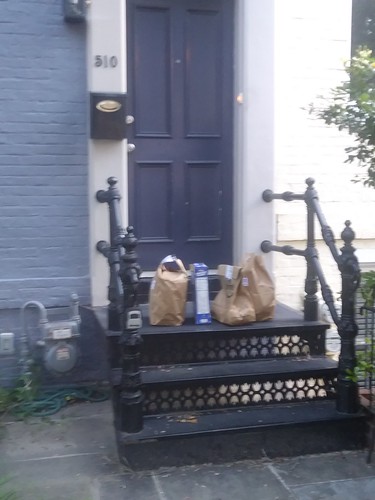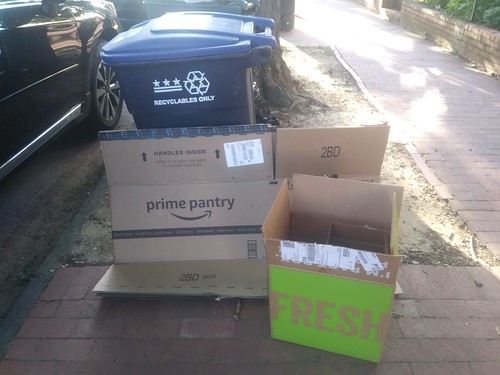Eastern Market's business issues are more complicated than street closures on weekends

Amazon Prime grocery delivery, about two blocks from Eastern Market. (Bad photo. I will try to capture this again.)

E-commerce food delivery boxes in recycling, Capitol Hill.
Eastern Market is DC's primary public market. Dating to the 1870s, it is a public food market of the type that existed before supermarkets. In 2007 I joined the Community Advisory Committee and a few months into that tenure, the building burned and was closed for three years for renovation.
Shortly after the reopening, the Mayor (Fenty) agreed to closing on the weekends, 7th Street SE in front of the market.

Ever since, the inside food vendors have been fighting this, arguing that it's the primary cause of their loss of business.
I keep arguing it's a potential strength, a differentiator, and that the reason for their decline in sales is far more complicated.
Since the time I've been on the CAC, when starting out there had been 3 Safeway supermarkets and 1 specialty market (Yes! Organic Market) and no other major competitors in their "retail trade area":
- 8 new supermarkets have opened in their retail trade area (1 Safeway, 1 Giant, 3 Harris-Teeters, 2 Whole Foods, 1 Walmart)
- as well as 3 specialty supermarkets (2 Trader Joe's and 1 Aldi)
- and more stores just outside of the retail trade area
- and many more farmers markets have opened in the RTA and across the city, reducing the need for people to go to Eastern Market for "the experience"
- mainline supermarkets began delivering groceries
- alongside direct e-commerce food sales, in particular by Amazon
- and the creation of meal kits as a line of business, both through online commerce and for sale at grocery stores
- the rise in eating out-of-home (restaurants)
- as well as the rise of restaurant meal delivery
- a revitalized Union Market district
- and two other "experience" quarters have opened nearby--the Navy Yard in Southeast and The Wharf in Southwest, competing for visitors
- not to mention that increasingly, people say they don't like to or don't know how to cook.
But the reality is that the whole of the supermarket business has been roiled and no firm is immune.
Right now, the DC-Baltimore area Shoppers Food Warehouse chain is shutting down illustrates the competitive situation. Major companies like Kroger and Albertsons (owners of Safeway) are trying to figure out how to maintain success in an ultra-competitive market. Firms continue to merge or go out of business. Etc.
Granted, providing assistance to car-based customers is inadequate--although I've been arguing the market should do delivery since 2007--but closing the street is the least of their worries. They should be figuring out why people who live on Capitol Hill aren't shopping there.
Labels: food-agriculture-markets, neighborhood planning, public markets, supermarkets-groceries, urban design/placemaking



6 Comments:
I don't live in the immediate trade area, but my trips to EM are about once every 2 or 3 years. I don't particularly long for it for the same reason I dislike "farmer's markets." Overpriced goods, inconvenient, crowded, too many kids and dogs, limited hours mean I'm not likely to "wander" in. I understand for some people the social experience outweighs the retail experience, but its not for me and I've always thought it was way overrated.
If you don't mind expanding, where do you grocery shop more generally? Do you cook reasonably often? Are you considering/do you do some of your food shopping online?
Thx.
Most groceries come from grocery stores. Aldi, Giant, Trader Joes, ethic markets. I take my lunch to work most days, and cook at home for dinner the majority of the time. I have never considered food shopping online. In my opinion, Eastern Market and "farmer's markets" seem to be for the infrequent cooks. They fetishize the food they cook on the rare occasions they do actually cook, and are willing to spend more. Because I cook a lot, I guess convenience and price are more important to me.
fwiw, I am probably similar to you, based on the stores you list. The thing is that EM needs to think of itself as a specialty market -- I am referring to the inside vendors. The departments there are comparable to the perimeter departments in a grocery store (meat, seafood, produce, dairy, etc.). And while the produce is not cost competitive at all, when you compare quality, the seafood, meat, poultry, cheese is comparable/as good/hopefully better than the supermarket.
Not bakery. While it probably is better than a supermarket, that's not saying much.
So the indoor vendors are really competing with other supermarkets on Capitol Hill for those customers, because except for hyper specialty goods (quail, maybe cheeses), people don't need to go out of their way to EM because they can find the stuff closer to home.
WRT fetishization/1, other farmers markets are more vibrant. There isn't a lot of innovation at EM with the weekend outside vendors.
WRT fetishization/2, as I mentioned in the post, lots of people are buying more prepared items, even if meal kits, and EM isn't able to serve such segments at present, other than rotisserie chicken...
Thank you for following up.
Nice Post...Thanks for sharing such valuable information I am also impressed by the creativity of the writer. This is excellent information. It is amazing and wonderful to visit your sitewhy need to market your company on twitter
Thank you for posting such a great information! found your website perfect for my needs.
Post a Comment
<< Home